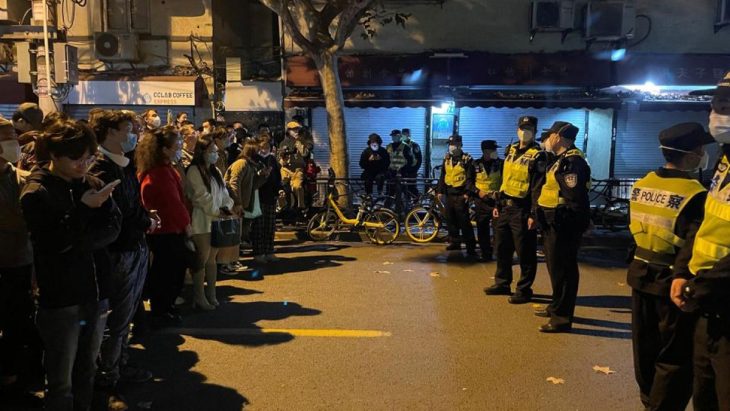Hundreds of people took to the streets in Beijing and Shanghai on Sunday to protest against China’s zero-Covid policy in a rare outpouring of public anger against the state. China’s hardline virus strategy is stoking public frustration, with many growing weary of snap lockdowns, lengthy quarantines and mass testing campaigns.
Why are these protests unprecedented?
As many China watchers have noted, civilian protests in China are not extremely rare but protests breaking out in synergy across China over a common subject is quite unprecedented in the mainland.
China has a history of witnessing labour and farmers’ protests, with some incidents of students protesting against campus-related issues; however, current demonstrations spread across the country have seen participation from multiple communities and mixed demography. The spontaneous exhibition of general mass dissent on the streets of multiple cities across China makes these protests unprecedented.
Where are the protests happening?
Social media posts of mass gatherings and sloganeering suggest anti-lockdown protests happening across over a dozen cities in China. Demonstrators clashed with the police in Shanghai on Sunday night.
Similar protests have been reported in Urumqi, Hotan, Nanjing, Beijing, Wuhan, Chengdu, Guangzhou, and Lanzhou. Several university campuses have also been witnessing such protests. According to some reports more than 70 centers of higher education in more than 10 provinces have witnessed some kind of protests.
Why are people protesting in China?
While most parts of the world have returned to the post-pandemic normal, Chinese government policy to achieve Zero Covid amid rising number of cases has imposed several restrictions in public life. A general sense of these protests is to oppose the strict Covid policing in China.
Isolated protests were reported earlier from Urumqi, capital of the Xinjiang province against the Covid policing but situation became worse on Thursday as 10 people were killed in a fire at a residential high-rise building in Urumqi. Many people held the lockdowns responsible for hampering the escape and rescue operations.
Demonstrations in support of the victims of Urumqi following the incident have been spreading across China like a wildfire. Even before Urumqi, there have been stray incidents of lockdown-related protests in China. Workers at the Foxconn iPhone manufacturing factory in Zhengzhou defied the strict measures and escaped from the facility. Protests were also reported in Haizhu District, Guangzhou earlier this month.
On October 13, a lone protestor later called The Banner Man disguised himself as a construction worker and placed two banners with slogans on the Sitong Bridge. He was later arrested by the police. His slogans “go on strike at school and work, remove dictator and national traitor Xi Jinping! We want to eat, we want freedom, we want to vote,” have managed to find many chanters in the recent protests.
Are people protesting against Xi Jinping and CCP as well?
While the common theme of the recent gatherings has been to protest against the strict anti-Covid guidelines, the protests have started to take shape of general dissent against Xi and the Chinese Communist Party (CCP). Videos of slogans directed against Xi and the party at these protests have been surfacing on social media.
Some of the protesters have also been heard chanting pro-democracy slogans calling Xi to step down.
Call for freedom has been the underlying theme of most of the protests, with “No to lockdown, Yes to freedom” being the most common slogan. Social media posts also suggested reports of large banners being put at Tsinghua University, calling Xi jinping a ‘f****g idiot’.
While state-controlled Chinese mainstream media has largely blacked out the coverage of the demonstrations, there are reports of police action against journalists working for foreign publications as well. A BBC reporter covering the Shanghai protests was arrested by the Chinese police during Sunday night protests.






